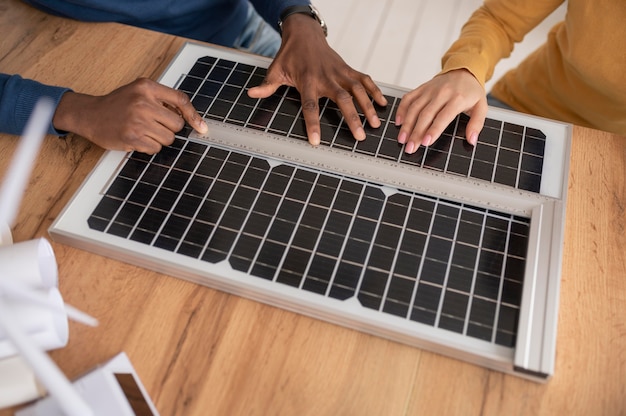Solar Panel Facts – Everything You Need to Know

Solar panels harness the power of the sun to generate electricity.
The use of solar panels can significantly reduce carbon emissions.
Solar panels convert sunlight into usable energy.
Solar panels are a renewable source of energy.
Solar panels can be installed on rooftops, making them a space-efficient energy solution.
Solar panels can be used to power anything from homes to cars.
The global solar panel market is growing at a rapid pace.
Solar panels work even on cloudy days, although their efficiency may decrease.
Solar panels have a lifespan of 25-30 years, making them a long-term investment.
Some solar panels are made from crystalline silicon, while others use thin film technology.
Solar panels can provide electricity to remote areas where access to the power grid is limited.
Solar panels can help reduce reliance on fossil fuels.
Solar panels have no moving parts, making them low-maintenance.
Solar panels can be integrated into building materials, such as solar roof tiles.
Solar panels require sunlight to produce electricity, so they are most effective in sunny regions.
Solar panels are silent and emit no greenhouse gases during operation.
Solar panels help to create jobs in the renewable energy sector.
Solar panels can help reduce electricity bills for homeowners.
Solar panels can be installed on agricultural land without interfering with crop production.
Solar Panel Facts – Everything You Need to Know part 2
Solar panels are a sustainable energy solution that can help combat climate change.
Solar panels can be combined with battery storage systems for reliable energy supply.
Solar panels can be recycled at the end of their lifespan, reducing waste.
Solar panels can withstand extreme weather conditions, including hailstorms and high winds.
Solar panels can be an aesthetically pleasing addition to buildings, enhancing their design.
Solar panels require no fuel and have no ongoing costs once installed.
Solar panels can generate electricity even in winter, although their output may be lower.
Solar panels have become more affordable in recent years, making them accessible to a wider audience.
Solar panels can increase the value of a property.
Solar panels can help countries achieve their renewable energy goals.
Solar panels can be connected to the power grid, allowing excess energy to be sold back to utility companies.
Solar panels can operate independently, making them suitable for off-grid applications.
Solar panels can be used in disaster-stricken areas to provide emergency power.
Solar panels have a high energy return on investment, meaning they produce more energy than is required for their manufacturing.
Solar panels are a silent and non-polluting alternative to diesel generators.
Solar panels can provide power in areas prone to frequent power outages.
Solar panels are a reliable and consistent source of energy when properly maintained.
Solar panels can help reduce the risk of utility grid failures.
Solar panels can be installed on various surfaces, including carports and facades.
Solar panels require minimal space and can be installed in urban areas with limited land availability.
Solar panels can help businesses save money on their electricity bills.
Solar panels can be integrated into the design of electric vehicles to extend their range.
Solar panels can be used to power outdoor lighting and signage.
Solar panels have a low environmental impact compared to other energy sources.
Solar panels contribute to energy independence and reduce reliance on imported fossil fuels.
Solar panels are a key component in building a sustainable future.

